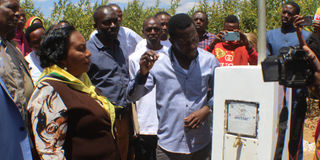Sangara villagers to benefit from Sh229 million water project

What you need to know:
The water project, with a 3.4km infrastructure, produces 352,800 litres of water per day, equivalent to 14,700 litres per hour as it electronically offers a pre-paid water service to customers.
Babati. Over 650 residents of Sangara Village in Babati District, Manyara Region who were facing water shortage will now get relieaf following the launching of a Sh229 million water project.
The water project, with a 3.4km infrastructure, produces 352,800 litres of water per day, equivalent to 14,700 litres per hour as it electronically offers a pre-paid water service to customers.
WaterAid Director Abel Dugange said durig the launching that they signed agreements last year to mplement the project with Babati District Council, Habitat for Humanity organization, eWater firm and Unit Trust of Tanzania (UTT-MFI).
However, Dugange explained that before the project was implemented, water scarcity at the village was at 20 percent contrary to 85 percent of the nation’s goal of water supply in rural areas.
"This project has targeted to sensitise innovations and attract the private sector to invest in the construction of infrastructures and in running water projects so that to simplify the availability of a sustainable and reliable clean and safe water service in rural areas," said Dugange.
Launching the project on behalf of the Regional Commissioner Alexander Mnyeti, Babati District Commissioner Elizabeth Kitundu called upon the residents of the area to safeguard the project to be sustainable.
The RC said that the government’s goal was to ensure that by 2020, 85 percent of those living in rural areas had access to clean and safe water and by 2025 it should be at 95 per cent and by 2030 at 100 percent.
For his part, Babati Rural MP Vrajilal Jituson revealed that the water project was of an electronic system that started to be implemented in Babati District and that Korogwe District in Tanga Region and Arumeru District in Arusha would also enjoy the same water supply of the project.
Jituson explained that a consumer would be able to draw water even during the night to save time and that a water seller would not be needed to be at a public water kiosk.
"It steps up cash security from getting lost due to water service, it enhances water consumption discipline as even a drop of water is paid for," said Jituson.
A resident of the village, Magdalena Bayo, said previously they had to walk long distances in search of water from water wells and streams, adding that the project had helped them avoid the hitch as it was brought closer to them.
"This project is good as it looks like using a cell phone voucher. You just enter a token and water comes out as you wish how much you should pay. Now we don’t walk long distances in search of water as we used wake up early in the morning and come across long queues for water," she says.




